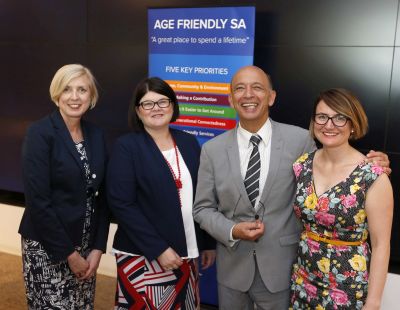21st November 2017
The President of ILC-BR, Alexandre Kalache, is currently in Australia advancing the ageing agenda of the South Australian Government.

He delivered a public lecture to a packed audience at the University of South Australia's Hawke Centre on November 21st. His presentation called for an education revolution to better accomodate the seismic changes brought about by the Longevity Revolution and the 4th Industrial Revolution. He made a passionate appeal for a paradigm shift away from knowledge-conveying instruction to learning for personal development and the release of creative potential. He stressed the need for learning to learn and firmly establishing Life-long Learning as the organising principle for education in the 21st Century.
The podcast is available on the Hawke Centre site: http://www.unisa.edu.au/Business-community/Hawke-Centre/Events-calendar/Creating-an-Education-Revolution-that-places-life-long-Learning-at-its-core-/
In the photo from the left to the right: Jeanette Walters (Director of Inter-governmental Relations & Ageing), Hon. Zoe Bettison (SA Minister of Ageing), Alexandre Kalache and Natalie Forde (University of SA)
A Shared Vision for Global Longevity of Rayne and Susana (newly elected Co-Presidents)
It is a profound honour to serve as Co-Presidents of the International Longevity Centre Global Alliance. Our partnership reflects the very spirit of the Alliance: global in reach, grounded in local realities, and united by a shared commitment to dignity, equity, and wellbeing across the life course.
27th January 2026
VNRs of HLPF at the UN: The 2030 Agenda for Sustainable Development
Voluntary national reviews (VNRs) were held at High-Level Political Forum on Sustainable Development (HLPF) from 14 to 24 July 2025, UN, New York. Each State shared Experiences and Lessons on the 2030 Agenda and SDGs implementation.
24th July 2025
The Intersectionality of Ageism & Sexism: Harnessing The Power of Older Women
During the 2025 UN High Level Political Forum, the ILC Global Alliance and partners hosted a side event to address the intersection of ageism and sexism, advocating for a UN convention to protect the rights of older persons.
16 July 2025


